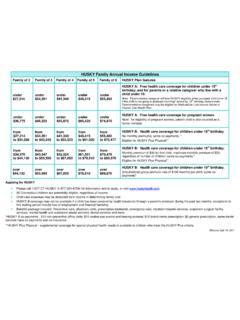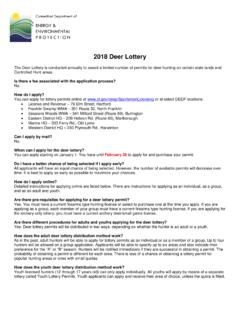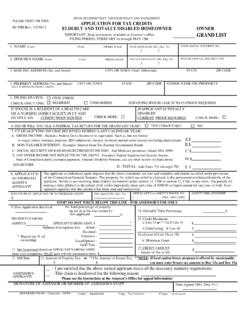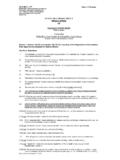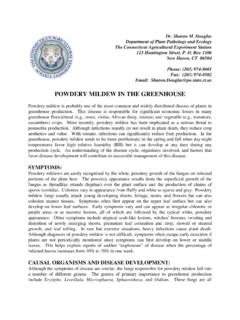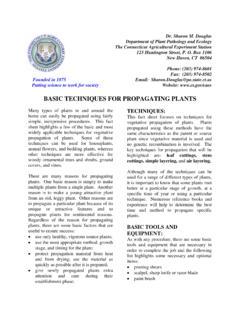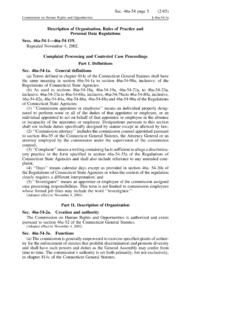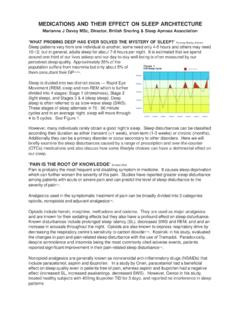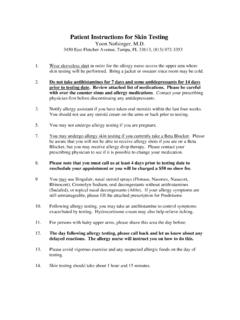Transcription of MEDICATIONS AND DYSPHAGIA SWALLOWING RISKS
1 DDS Health Standard 07-1 Guidelines for Identification and Management of DYSPHAGIA and SWALLOWING RISKS Attachment A 1 MEDICATIONS AND DYSPHAGIA / SWALLOWING RISKS [Some of the MEDICATIONS that can impact SWALLOWING and why this happens] DYSPHAGIA as a side effect of medication MEDICATIONS that affect the smooth and striated muscles of the esophagus that are involved in SWALLOWING may cause DYSPHAGIA . MEDICATIONS with anticholinergic or antimuscarinic effects Benztropine mesylate (Cogentin) given for movement related effects caused by some psychotropic meds Oxybutynin (Ditropan) improves bladder capacity Propantheline (Pro-Banthine) inhibits the release of stomach acid Tolterodine (Detrol) affects bladder capacity MEDICATIONS that cause dry mouth (xerostomia) may interfere with SWALLOWING by impairing the person s ability to move food MEDICATIONS that cause Dry mouth (xerostomia) ACE Inhibitors- used for high blood pressure Captopril (Capoten) Lisinopril (Prinivil, Zestril) Antiarrythmics- cardiac preparations Disopyramide (Norpace) Mexiletine (Mexitil) Procainamide (Procan)
2 Antiemetics- used for nausea Meclizine (Antivert) Metoclopramide (Reglan) Prochlorperazine (Compazine) Antihistamines and decongestants- used for cold symptoms Chlorpheniramine (Chlor-Trimeton) Diphenhydramine (Benadryl) Pseudoephedrine (Sudafed) Calcium channel blockers- used for chronic chest pain due to angina Amlodipine (Norvasc) Diuretics- given to get rid of excess fluid in body Ethacrynic adic (Edecrin) SSRIs (Selective serotonin reuptake inhibitors)- antidepressant MEDICATIONS Citalopram (Celexa) Fluoxetine (Prozac) Nefazodone (Serzone) Paroxetine (Paxil) Sertraline (Zoloft) Venlafaxine (Effexor) * see also Antipsychotic/Neuroleptic medication list below Local anesthetics such as Novocain which is often used for dental work may temporarily cause a loss of sensation that may affect SWALLOWING before it wears off.
3 Antipsychotic/ Neuroleptic MEDICATIONS given for treatment of psychiatric disorders may affect SWALLOWING as many of them produce dry mouth and some of them can cause movement disorders that impact the muscles of the face and tongue which are involved in SWALLOWING . Antipsychotic/ Neuroleptic MEDICATIONS Chlorpromazine (Thorazine) Olanzapine (Zyprexa) Clozapine (Clozaril) Quetiapine (Seroquel) Fluphenazine (Prolixin) Risperidone (Risperdal) Haloperidol (Haldol) Thioridazine (Mellaril) Lithium (Eskalith, Lithobid) Thiothizene (Navane Loxapine (Loxitane) Trifluoperazine (Stelazine) DDS Health Standard 07-1 Guidelines for Identification and Management of DYSPHAGIA and SWALLOWING RISKS Attachment A 2 DYSPHAGIA as a complication of the therapeutic action of the medication MEDICATIONS that depress the Central Nervous System (CNS) can decrease awareness and voluntary muscle control that may affect SWALLOWING .)
4 MEDICATIONS that depress the CNS Antiepileptic drugs- for seizures Carbamazepine (Tegretol) Gabapentin (Neurontin) Phenobarbital Phenytoin (Dilantin) Valproic acid (Depakote) Benzodiazepines- antianxiety drugs Alprazolam (Xanax) Clonazepam (Klonopin) Clorazepate (Tranxene) Diazepam (Valium) Lorazepam (Ativan) Narcotics- for pain relief Codeine (Tylenol #3) Fentanyl (Duragesic) Propozyphene (Darvon, Darvocet) Skeletal muscle relaxants- relieves muscle spasms and relaxes muscles Baclofen (Lioresal) Cyclobenzaprine (Flexeril) Tizanidine (Zanaflex) MEDICATIONS that can cause esophageal injury and increase risk Some MEDICATIONS can cause DYSPHAGIA because of injury to the esophagus caused by local irritation. This can happen because the person is in a reclining position shortly after taking the medication or because an inadequate amount of fluid is taken with the medication .
5 In both instances, the MEDICATIONS remain in the esophagus too long, potentially causing damage and affecting SWALLOWING . Drugs that may cause esophageal injury Acid- containing products Clindamycin (Cleocin) Doxycycline (Vibramycin) Erythromycin (Ery-tabs, E-mycin) Tetracycline (Sumycin) Aspirin Bayer aspirin and generic brands Bisphosphonates- given for osteoporosis Alendronate (Fosamax) Iron containing products FeoSol, Feratab, Slow-FE, Fer-Iron etc. Methylxanthines- bronchodilators Theophylline (Theo-Dur, Unidur, Slo-Bid) Nonsteroidal anti-inflammatory drugs- relieves pain Ibuprofen (Advil, Motrin) Naproxen (Aleve, Naprosyn) Potassium chloride supplements K-Dur, K-tabs, Klor-Con, Slow K, etc. Vitamin C (ascorbic acid) supplements Allbee with C Vitamin C tabs, etc.
6 Other MEDICATIONS such as high dose steroids and chemotherapeutic (anti-cancer) preparations may cause muscle wasting or damage to the esophagus and may suppress the immune system making the person susceptible to infection. Reference: Balzer, KM, PharmD, Drug-Induced DYSPHAGIA , International Journal of MS Care, page 6, Volume 2 Issue 1, March 2000. ( )
